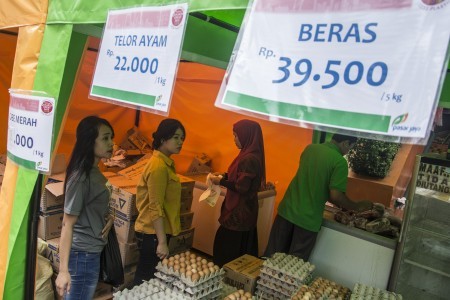Popular Reads
Top Results
Can't find what you're looking for?
View all search resultsPopular Reads
Top Results
Can't find what you're looking for?
View all search resultsJokowi expects normal prices for staple foods as Ramadan approaches
The government plans to ensure the supply and distribution of staple foods to prevent prices from soaring ahead of the Islamic holy month of Ramadan.
Change text size
Gift Premium Articles
to Anyone
P
resident Joko “Jokowi” Widodo says he expects the prices of staple needs to return to normal as the government works to ensure enough supplies for the upcoming Islamic holy month of Ramadan, slated to start on April 23.
“I have checked with Bulog [the State Logistics Agency] and regions regarding the harvest. I see that rice, meat, egg, sugar, wheat and other staple needs are still in good condition,” Jokowi said during an online meeting with his ministers on Thursday.
Authorities had been procuring additional supplies of staple foods to prevent their market prices from surging ahead of Ramadan. Among the commodities are sugar, the price of which was expected to be about Rp 12,500 (76 US cents) per kilogram, and garlic, which would cost between Rp 20,000 and Rp 30,000 per kg.
The Jakarta office of Statistics Indonesia (BPS Jakarta) recorded that the average price of sugar in the capital city had risen by 20.62 percent to Rp 15,583 per kg, while garlic rose by 0.21 percent to Rp 44,465 per kg.
Read also: Staple foods safe, but masks, sanitizer gone from markets as consumer behavior shifts
Apart from ensuring supply, the government planned to prevent the commodity’s distribution from being disrupted as some regions across the country were closing roads in an effort to enforce large-scale social restrictions to prevent the spread of COVID-19.
A number of regions had closed major roads and borders, as well as enforced curfews to prevent the disease from spreading, including Tegal in Central Java, Bandung in West Java and Balikpapan in East Kalimantan.
“We also have to ensure the logistics works smoothly because the staple food needs to be available in the markets,” said Jokowi.
“I expect the home minister to reprimand regional leaders who close roads in an effort to make sure the logistics are free from disruption. Yesterday, I received reports from two regions that the distribution of rice was disrupted because some roads were closed.”
As of Thursday, there are 1,790 confirmed COVID-19 cases across the nation, with 170 deaths and 112 recovered cases. Jakarta became the national epicenter of the outbreak, accounting for 897 confirmed cases, more than half of the national figure.
As such large-scale social restrictions were expected to hit people with low incomes the hardest, the government was allocating Rp 405 trillion for, among other things, health care and social safety net programs, including the Family Hope Program, Staple-Food Card, Preemployment Card and electricity subsidies.
Read also: Government expedites imports of staple needs to stabilize prices
The government has launched social safety net programs aimed at helping low-income people make ends meet while going into self-quarantine. Many citizens, especially poor ones, had ignored the government’s instruction to stay at home because they had to go to work.
President Jokowi had also urged religious and civil society organizations to encourage people to implement social distancing measures.
The government had declared the COVID-19 outbreak a public health emergency, imposing large-scale social restriction measures. It temporarily suspended schools and offices, as well as religious and public activities.
“It is important to tell them the importance of hand washing, reducing mobility outside their homes, wearing face masks and implementing large-scale social restrictions, which is in line with the health protocols both inside and outside their houses,” said Jokowi.










